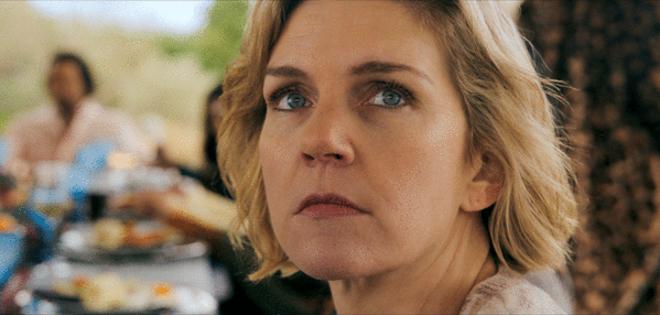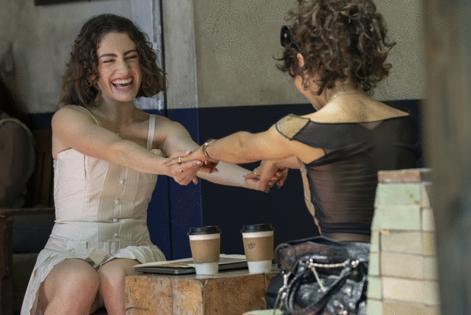Nina Metz: Women grapple with profound loneliness in a trio of new TV shows
Published in Entertainment News
Search the internet for “male loneliness” and you’ll find articles both parsing this so-called epidemic and others challenging its existence. Regardless of gender, I suspect most people are lonely right now, at least to a degree. But on television, what you’ll find are stories exploring female loneliness in particular, even if these series aren’t explicitly marketing themselves that way. Hollywood, it seems, is picking up on something that professional opinion-havers are not.
The HBO comedy “I Love LA” (which premiered earlier this month) tackles a familiar story of humorously chaotic 20-something strivers, with their dreams of social media fame and influencer income. They are with youthful exuberance, but they are also miserable and desperate to hide that fact — maybe even from themselves. Created by and starring Rachel Sennott, the show brings to mind the old axiom: Surrounded by people but lonelier than ever.
Like “Girls,” its New York-set predecessor, the friendships in “I Love LA” come with air quotes. No one genuinely likes each other, and while a good story allows its characters to be flawed, this is more than that: Their connections with one another are hollow. Maybe that’s because older generations have handed them a world that demands an endless hustle to keep their heads above water, where seeking out meaningful relationships is for suckers.
I’ve seen the series described as a hangout show, but I’ve never walked away from a hangout show feeling so … well, lonely. And sad about our collective trajectory.
On Apple, “Pluribus” is vastly different in tone and style from “I Love LA,” but it too is a story of profound loneliness. It’s the latest series from “Breaking Bad” and “Better Call Saul” creator Vince Gilligan, about a successful, if unfulfilled, middle-aged romance author named Carol (Rhea Seehorn) who finds her life suddenly upended. Everyone in her hometown of Albuquerque has seemingly undergone a personality transplant, wherein the population has become an undifferentiated plurality of exceedingly nice, somewhat robotic, creatures.
Turns out, it’s not just Albuquerque, but the entire world that’s been affected. What the hell happened? While billions of people have changed, Carol and her prickly personality remain immune to whatever mysterious force is responsible for this shift.
The show defies categorization — plucking ideas from “Invasion of the Body Snatchers,” “The Stepford Wives” and “The Leftovers” — but it is ultimately about a woman boiling over with rage and frustration, lurching through her new reality in a state of livid isolation. There is no one who understands her. No one she can trust. No one to laugh with or complain to. No one who understands her fears, or her disgust with these people who no longer seem fully human thanks to their perma-smiles and good cheer. Even for a misanthrope like Carol, this is hell on Earth.
There’s even loneliness coursing through the fizzy romantic comedy of Netflix’s “Nobody Wants This.” Justine Lupe plays Morgan, a woman who uses sarcasm to deflect her insecurities as she watches her sister find a real connection with another person. Despite Morgan’s faux-blasé affect, the cracks are evident. When her sibling answers a call about a business deal concerning them both, the man on the phone asks, “Should we grab your sister, or does that not matter?” Morgan frantically jumps in: “Hi, I matter! Hi!” It’s a funny line, but there’s so much sting and subtext in it as well. In Season 2, which premiered last month, Morgan’s desperation and loneliness are so intense that they drive her into an ethically dubious relationship with her therapist.
Perhaps it’s par for the course that the tagline for new season of Netflix’s reality show spinoff of “Squid Game” asks “Why make friends when you can make millions?” We all need money and companionship for survival, but the depressing subtext of so many competition-based reality shows suggests you can’t have one without sacrificing the other.
It’s surely only a matter of time before we see a TV series about people trying to combat their loneliness with artificial intelligence. The 2013 Spike Jonze movie “Her” got there first, starring Joaquin Phoenix as a man who falls in love with his Alexa-like virtual assistant, voiced by Scarlett Johansson. But the film presumes a consciousness that does not exist in the kind of chatbots that people in the real world interact with — and, in some cases, delude themselves into believing are real relationships. For all the emptiness of the friendships depicted in “I Love LA,” at least they are human. What does it say about us as a species that people are seeking out simulated social connections with a computer?
Maybe the best way to combat loneliness is also the most straightforward: Start doing things with other people. For the last several weeks, for example, the distressing reality of immigration raids across Chicago has also meant that neighbors are getting together and organizing in ways they hadn’t previously.
In the documentary “Join or Die” (on Netflix), the social scientist Robert Putnam explores the benefits of simply joining a club, an idea he writes about in his nonfiction book “Bowling Alone: The Collapse and Revival of American Community.”
Putnam argues that the bonds that form when you join a club or organization are not just a matter of “warm, cuddly feelings,” as he puts it. “In area after area of our community life, our communities don’t work as well when we’re not connected.” And that, he says, has far-reaching effects not only on us as individuals, but on democracy itself.
Unfortunately, our current moment bears that out.
———
(Nina Metz is a Chicago Tribune critic who covers TV and film.)
———
©2025 Chicago Tribune. Visit chicagotribune.com. Distributed by Tribune Content Agency, LLC.
















Comments